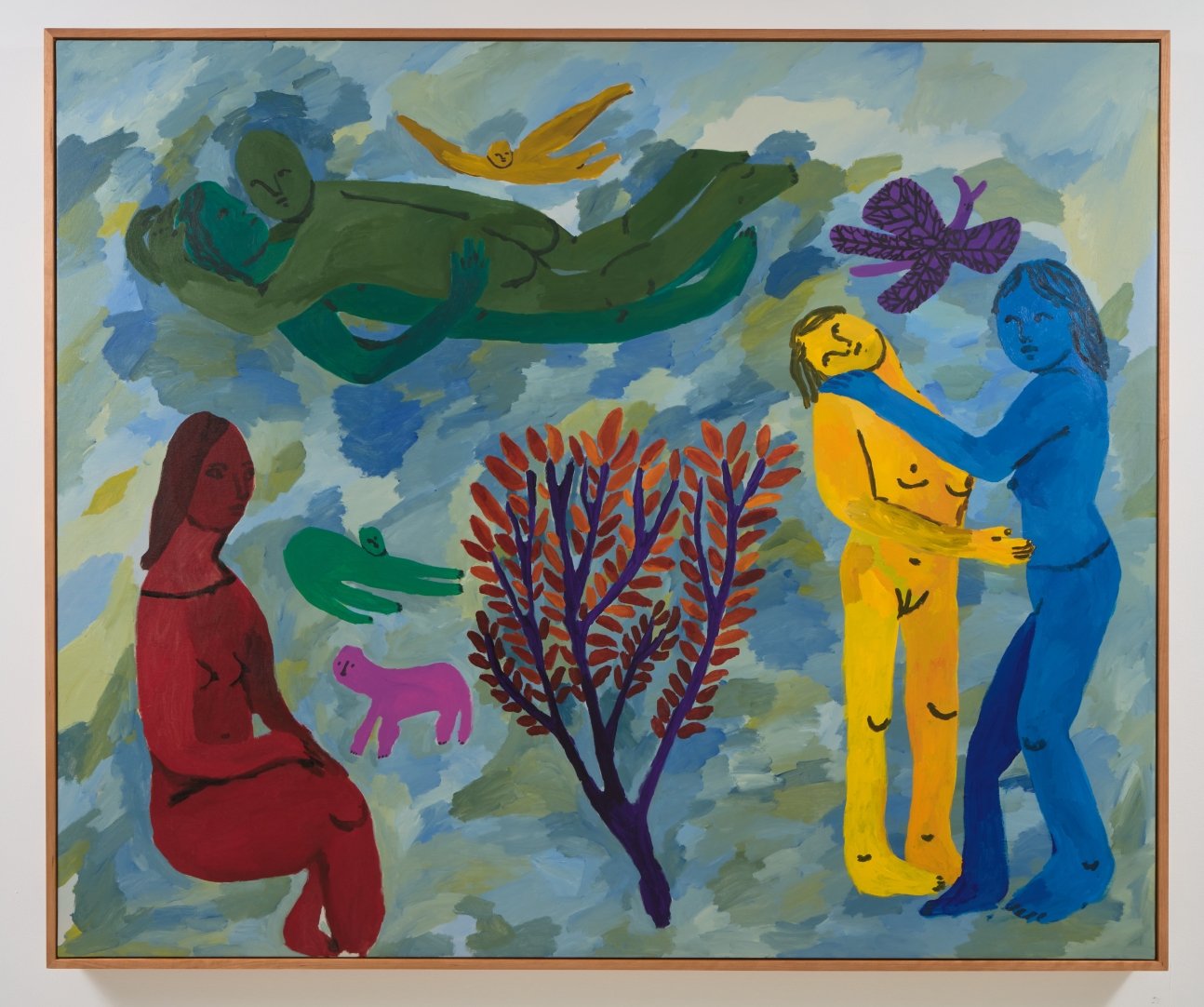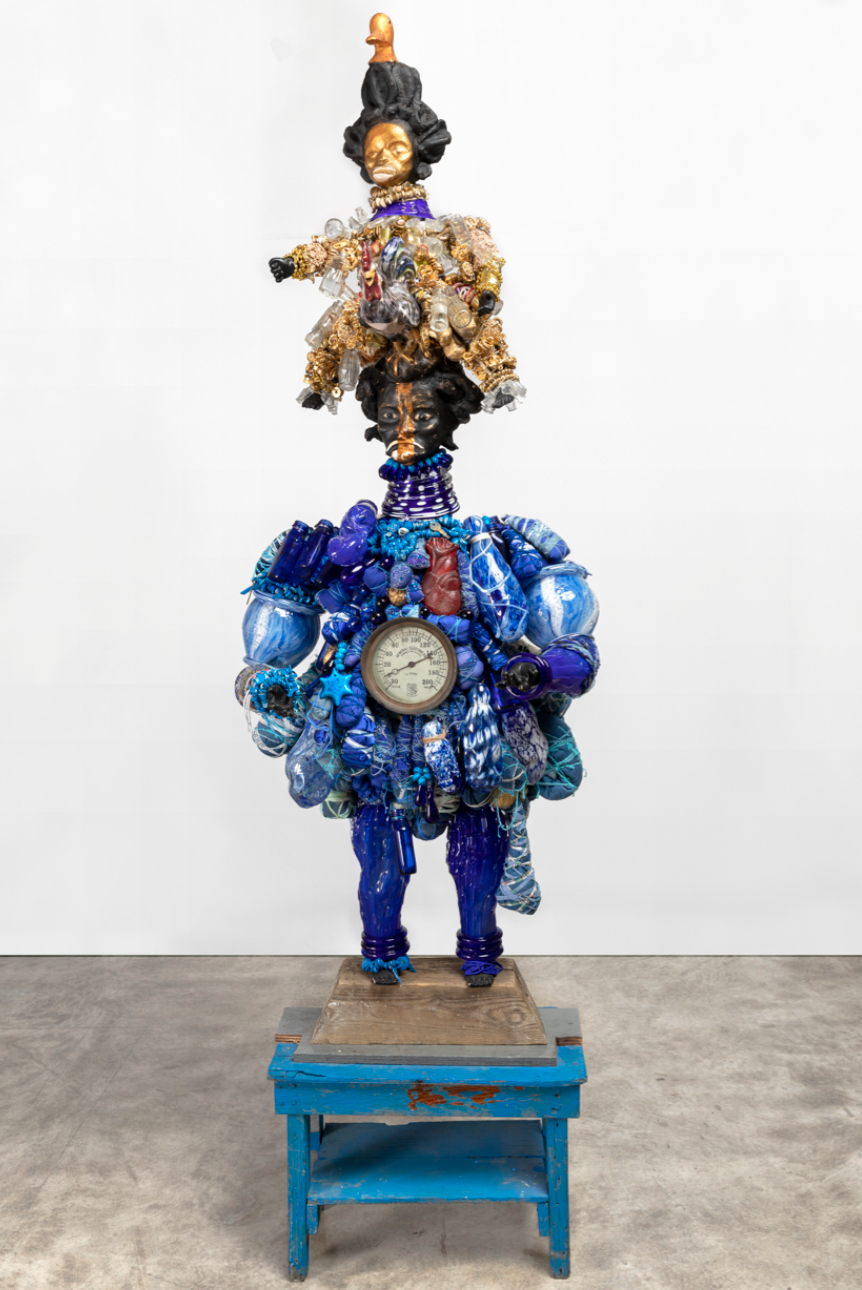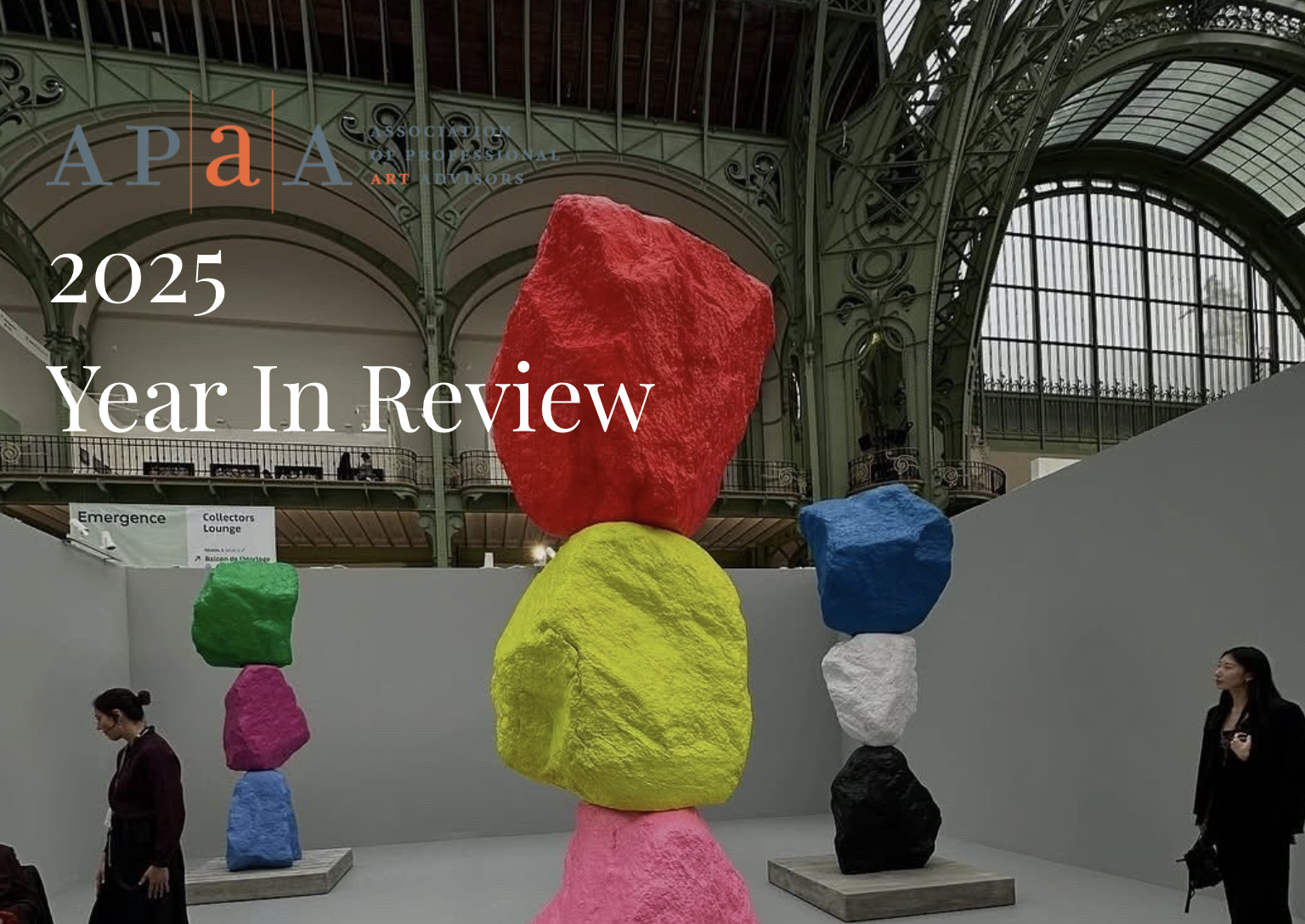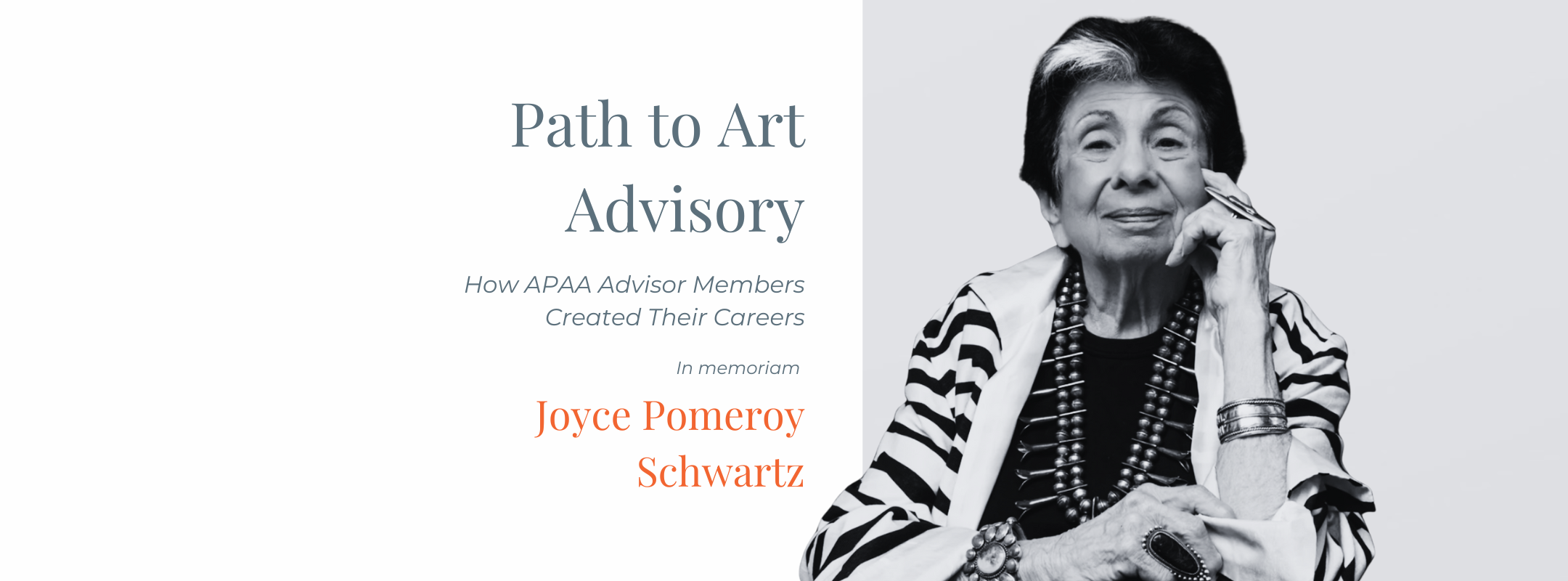APAA + Independent – Top Picks From the Fair for May 2022
Ahead of this Spring’s iteration of the Independent, APAA members Erin Dodson, Curator, Hallmark Cards, and Julian A. Jimarez Howard, Curator, Johnson and Johnson, had a wide-ranging conversation with Elizabeth Dee, co-founder of the fair, sponsored by Crozier. Sit in on their conversation.
APAA members also weighed in with their top picks for the fair, ranging from Geta Brătescu to William T. Wiley. Learn more about these artists below.
With the Western World’s attention grimly set on Eastern Europe, we might find a glimmer of inspiration in the life and work Geta Brătescu. If one were limited to a single word to describe the multi-valent practice of this outstanding artist, it would be perseverance. From the periphery of Communist-controlled Romania in the 1950s which forced her practice “underground” to the halls of the Venice Biennale in 2017 which helped further expose her genius to a global audience, her conceptualist practice, experimental and tenacious approach, and feminist perspective sit at the crossroads of today’s contemporary culture, evidencing just how established these roots really are. From collage to video to her accomplished line work, she imbues a sensitive radicality into her work that still has very much to teach contemporary audiences. – Julian A. Jimarez Howard
Lois Dodd locates magic in the mundane. Her paintings are intimate not only in scale, but in content, sourced entirely from her environs. Dodd often revisits subjects and locations, painting “en plein air” to capture the recurring nuances of daily life: the light of coastal Maine, a glowing barn window, trees transitioning between seasons, a suspended clothesline. Dodd’s observational approach reveals subtleties marked by the passage of time. A painter for over 60 years, now in her 90s, Dodd grounds the “in between” moments she captures using structural geometry that lends her scenes a sense of permanence. A low-key force in American east coast representational painting, Dodd is also a hero to a new generation of figurative and landscape painters. – Wendy Cromwell
In the first presentation of her work in New York beyond her exhibitions with the quilters of Gee’s Bend, the quilts of Rachel Carey George (1908-2011) at Nicelle Beauchene are a great example of the balance between the continuity of a creative tradition passed through generations of mothers and daughters, and the celebration of individual expression. While the graphic black and white patterns in George’s quilt My Way (I refuse to follow the normal pattern) from the 1970s may recall traditional patterns found in quilt making, the artist celebrates freedom and individuality in her design, with triangles arranged in a rhythmic, circling dance. George’s work is presented alongside contemporary artist Ruby Sky Stiler, in an intergenerational conversation on pattern, abstraction, and narratives of care and relationships. – Erin Dodson, Curator, Hallmark Art Collection
Vanessa German’s “Keep Dreaming! A Map to the power of imagination in times of war & sorrow”, showing at Kasmin, sheds light on society’s past and offers a roadmap for the future. German collects and assembles found objects into sculptures that are reminiscent of Congolese power figures, which possess power from their materials and offer protection against evil. “Keep Dreaming!” is made up of two metaphorical sections: The blue base represents the weight of history and uses forms that reference the violence cast on African Americans. The gold top is a stark contrast and provides a glimmer of hope for the future with a gold river of imagination flowing down to the base.
German’s hero’s journey as a self-taught artist and contributions to her neighborhood in Pittsburgh are equally as powerful as her work. Her practice is a testament to art’s transformative power and ability to heal ourselves and communities. – Victoria Burns
“Like a kid in a candy store” is what I find myself thinking when I stand in front of Emma Kohlmann’s works on paper…kaleidoscopic cornucopia of figures, flora, fauna and forms. Often stacked atop and sidled next to one another, like two-dimensional specimen jars in saturated color, what it is about these anthropomorphic, deceptively faux-naif forms, non-binary Boteros bursting the seams of the picture plane? They are life, encapsulated: I see Grimm’s fairy tales, John James Audubon, feminist theory, Mexican Olmec ceramic heads and DIY ‘zines, all rolled together into an eye candy of the most dazzling variety. I hear there will be paintings, too, at the Independent; can’t wait to sample these new sweet treats. – Liz Parks
Los Angeles-based artist Kent O’Connor paints portraits and still lifes that feel both serious and absurd. His paintings “Untitled” and “Street Objects”, showing at Matthew Brown Gallery, offer a refreshing take on the classic subjects by creating a sense of playful curiosity that is often missing from both genres.
O’Connor’s paintings start from observation. In his still lifes, the artist constructs worlds of misfit objects that initially bear no significance until they are presented on a canvas. Their pairings provoke a search for some semblance of meaning, yet the joke is that there often isn’t one. His portraits, on the other hand, exhibit a more personal side by showcasing himself or friends in a state of irreverent or uncomfortable boredom. Ultimately, O’Connor’s paintings allow us to reflect on life’s awkward and ordinary moments. – Victoria Burns
Ruby Sky Stiler’s mixed media works use paint, resin, paper and graphite to build reliefs that echo the materiality of stone or wood. The artist’s sculpture practice is evident in these works, which balance the line between sculpture and two-dimensionality with their illusionary quality. Sky Stiler’s human forms suggest the formal qualities of antiquities and stylized characteristics of Cubism, adding art historical and cultural references to these recognizable portraits. The contrast between the foreground and background, along with the deep, pointed gaze of each subject adds to the depth of the work, drawing you in as a viewer. – Elizabeth Fiore
Altoon Sultan’s intimately scaled egg tempera paintings presented at Independent are a study in contrasts. The bold abstractions of industrial and agricultural machinery and vivid colors have a dynamic presence—and yet these small-scale paintings, meticulously rendered in egg tempera on parchment, suggest a quiet, almost meditative artistic practice.
The works continue her decades long practice in egg-tempera which was inspired by a visit to an exhibition at the Morgan Library of 15th c. illuminated manuscripts. Sultan has engaged with traditions of craft and the history of art from the Renaissance through the 20th century to the present. That interest in craft is evident in the choice of materials and techniques she chooses to create her work—a marriage of materiality and craft, abstraction and representation, that underlie these small and powerful paintings. – Megan Fox Kelly
The messy line between Fashion and Art is, perhaps, a false dichotomy. Tenant of Culture (the artistic practice of Hendrickje Schimmel) is someone pushing beyond such surface level comparison and reaching into far more interesting fields of inquiry. Their graduate work at London’s Royal College of Art, “A Just Game / How to preserve a Happening” drew poignant connections between the archive and embodied practice as much as it did between mass culture and the selection of objects into high culture. The Flash and Puzzlecut series works on display here continue to reflect on history through their layered (literally) critiques of anthropocentric culture and the uncanny valley of consumer capitalism’s value-based frameworks. – Julian A. Jimarez Howard.
William T. Wiley, an artist associated with 1960s Bay Area Funk art (a scarcely definable term), was influential to a generation of artists due to his unconventional approach, and to his time spent as a professor in the art program at UC Davis. He passed away last year, in April. Wiley’s work is tenderly absurd and asks for sustained looking to tease out the references and layers of meaning replete with humor, criticism, and affection. His paintings from the early aughts at Parker Gallery’s booth cover a range of his favorite areas of contemplation, including art itself, and hint at the follies and anxieties of the time concerning war, oil, and injustice. The scrawled text and imagery spring from something one might see drawn on a high school notebook into deep, complex spaces where the social, psychological, and spiritual intertwine. His work is currently the subject of an exhibition curated by Dan Nadel at the Jan Shrem and Maria Manetti Shrem Museum, which closes May 8th. – Erin Dodson, Curator, Hallmark Art Collection







